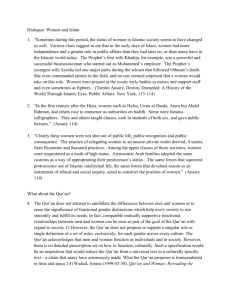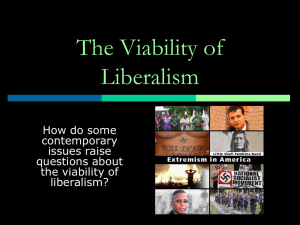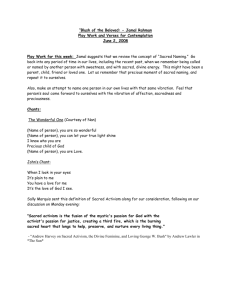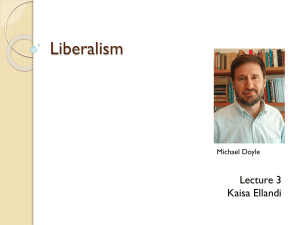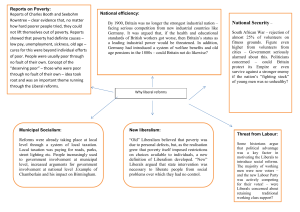If God`s Laws Aren`t Liberal, Why Should Ours Be
advertisement
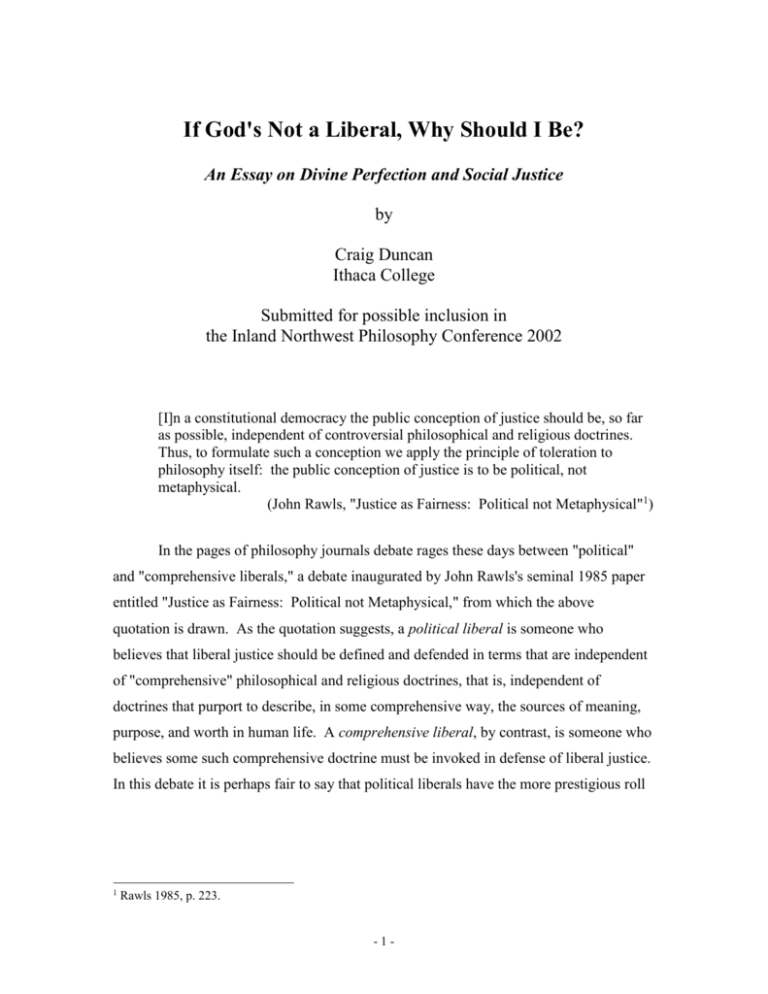
If God's Not a Liberal, Why Should I Be? An Essay on Divine Perfection and Social Justice by Craig Duncan Ithaca College Submitted for possible inclusion in the Inland Northwest Philosophy Conference 2002 [I]n a constitutional democracy the public conception of justice should be, so far as possible, independent of controversial philosophical and religious doctrines. Thus, to formulate such a conception we apply the principle of toleration to philosophy itself: the public conception of justice is to be political, not metaphysical. (John Rawls, "Justice as Fairness: Political not Metaphysical"1) In the pages of philosophy journals debate rages these days between "political" and "comprehensive liberals," a debate inaugurated by John Rawls's seminal 1985 paper entitled "Justice as Fairness: Political not Metaphysical," from which the above quotation is drawn. As the quotation suggests, a political liberal is someone who believes that liberal justice should be defined and defended in terms that are independent of "comprehensive" philosophical and religious doctrines, that is, independent of doctrines that purport to describe, in some comprehensive way, the sources of meaning, purpose, and worth in human life. A comprehensive liberal, by contrast, is someone who believes some such comprehensive doctrine must be invoked in defense of liberal justice. In this debate it is perhaps fair to say that political liberals have the more prestigious roll 1 Rawls 1985, p. 223. -1- call, for in addition to Rawls, prominent political liberals include Thomas Nagel, Brian Barry, Ronald Dworkin, Charles Larmore, and Bruce Ackerman.2 One implication of political liberalism is that the state should so far as possible remain neutral with respect to matters of religion. If by "neutral with respect to religion" we mean that the state's policies are justified in a way that neither affirms nor denies any sort of religious claims, then this ideal of neutrality follows immediately from the definition of political liberalism just given. In this paper I will examine two religiouslybased challenges to this liberal ideal of neutrality, which I will call "the challenge of divine law" and "the challenge of divine example." The first comes from the Qur'an and the second from the New Testament; both stem ultimately from taking the idea of divine perfection very seriously. In light of these challenges, I will conclude that the sort of religious neutrality genuinely achievable is much more limited in scope than political liberals typically think to be the case. The Challenge of Divine Law. The most formidable challenge to the ideal of religious neutrality comes from those who believe God himself has left explicit instructions as to the sorts of laws that ought to be in place. I have in mind here religious adherents who believe that God has revealed to his children a package of model legislation in the form of divine laws. One need look no further than recent headlines to find examples of such adherents, filled as our papers are these days with reference to Islamic fundamentalists. One thing uniting these fundamentalists is their wish to restructure society in accordance with Islamic law (shari'a) as they interpret it. This is not to suggest that fundamentalists all agree on how best to interpret Islamic law, and it is certainly not to suggest that the best interpretation of Islamic law is a fundamentalist one. I do wish to observe, though, that Islamic fundamentalists have not simply gratuitously willed into existence the very idea of a specifically Islamic law. For the truth of the matter is that the Qur'an does contain numerous and very explicit instructions regarding the types punishments that ought to be imposed for various sorts of crimes, as well as 2 See Nagel 1991, Barry 1995, Dworkin 1978, Larmore 1987, and Ackerman 1980. For Rawls's full-length defense of political liberalism, see Rawls 1993. For a treatment specifically devoted to religion, see Audi 2001, pp. 37-41, and passim. -2- explicit instructions regarding the shape that marriage, divorce and inheritance law ought to take.3 The challenge this poses to liberal neutrality is not hard to see. On the face of it, it would appear impossible for liberals to be neutral with respect to a religion whose deity instructs law-makers to pass illiberal laws. If a religion has political content of this sort, then it is a political rival to liberalism, and surely liberals cannot be neutral with respect to their very own rivals! There is a more picturesque way of making this same point. This comes with the observation that those who believe God has issued his own model legislation are likely to refer to God as the "Divine Law-maker," or the "King of Kings" or the "Ruler of Heaven and Earth," or something else along those lines.4 On this view, though, the very idea of God has political content, and to claim God has commanded such-and-such just is to make a political claim. How could religion possibly be irrelevant to politics, as the liberal ideal of neutrality would have, if God is in fact the highest political authority around? Hence political liberals must surely concede they are not neutral with respect to those who believe God has issued non-liberal commands to human law-makers. I believe this line of thought reveals a fairly obvious limitation to liberal aspirations to neutrality. I am not sure this settles the matter, however, for I can imagine a political liberal who responds as follows to a law-maker who believes in divine legislation: "Look, you think God requires law-makers to pass illiberal laws, but whether this is true or not about God—I'm not saying it is or it isn't—it is just your private belief that it is true, and thus you have no right to act on it as a public official." Being able to imagine this possible political liberal reply, we thus ought to ask whether it is a defensible one. I do not believe it is, and I wish to say why. To do that I will need to examine the idea of divine law, and to do this I will in turn need to examine the idea of divine authority. Toward that end, I wish briefly to consider three rival accounts of divine authority. On the first account God's authority derives from his vast power—specifically, his power to inflict infinite punishment on 3 For information on this, see the helpful summary and commentary in Sherif 1995, Chapter Eight. E.g. Sura 5 verse 123: "To God doth belong the dominion of the heavens and the earth, and all that is therein, and it is He who hath power over all things" (Sherif's translation). Faruq Sherif notes that this same passage is re-iterated at least twenty times in the Qur'an (Sherif 1995, p. 138). 4 -3- those who disobey his commands. Popular though this account was in the past (and still to some degree is), there is little to be said for it. It is nothing other than the doctrine of "might makes right," and here Rousseau's succinct dismissal is apposite: If a brigand takes me by surprise at the edge of the woods, must I not only give up my purse by force; am I obligated by conscience to give it even if I could keep it away? …Let us agree, therefore, that might does not make right, and that one is only obligated to obey legitimate powers.5 The second account of God's authority, by contrast, alleges that since God created the universe, it is effectively his property, to do with as he pleases; inasmuch as we are part of the universe, we are duty-bound to respect God's plans for it. Something like this was in fact the view of no less a liberal than John Locke, who sought as follows to justify his claim that natural law requires us not to harm others: For being all the workmanship of one omnipotent and infinitely wise maker, all the servants of one sovereign master, sent into the world by his order and about his business, they are his property whose workmanship they are, made to last during his, not one another's pleasure.6 Whether this account of divine authority is compatible with liberalism or not I will not attempt to say, except to mention that I think the very of idea of another being, even God, owning humans ought to make liberals very uneasy at best. But whether liberal-friendly or not, I do not believe this is a satisfying account of divine authority. For to put it mildly, it is far from clear that the act of creating a living being grants one ownership of that being. True, I use the pronoun "my" to refer to "my son," but this is no more the "my" of ownership than is the "my" in expressions like "my mother" or "my shadow." This skeptical point can be put most starkly if we suppose ourselves to have been created by an evil demon for purposes of his sadistic amusement (a thesis that perhaps better fits the evidence than traditional religious doctrine does!). Were this the case, I think rebellion, rather than slavish obedience, would be perfectly in order, even if in light of the demon's superior power our rebellious acts were doomed to be nothing more than symbolic protest. 5 Rousseau 1978 (Bk I, Ch. 3), p. 49. Locke 1993, p. 264 (paragraph 6). Locke also argues against suicide on similar grounds (ibid). As far as I am aware, Locke never noticed the tension between this "we are God's property" line of thought and his famous "self-ownership" argument for private property. 6 -4- Perhaps it was an awareness of this shortcoming that led Locke in the passage just quoted to stipulate that our maker is in fact "omnipotent and infinitely wise." This rules out the evil demon counterexample, but in doing so it suggests an independent third, and more appealing, account of God's authority: he is a perfect being, perfect in power, wisdom, and goodness. Surely such a being will never command you to do something there is not very good reason for you to do, for such a command would be incompatible with God's perfect wisdom and goodness. An analogy is instructive here. Imagine, for instance, an infinitely knowledgeable and trustworthy physicist. I would never go wrong in believing such a person's statements about physics, and would always go wrong in failing to believe them. Something similar is true of God: I would never go wrong in doing as God commands, and would always go wrong in not doing so. In short, God's authority on this account is the authority of an expert who is expert on everything—God is an "omni-expert," if you will. If God should exist, then this account of his authority strikes me as perfectly sound. To be sure, one could question whether the authority of an expert is such as to ground a specifically moral obligation of obedience on the part of the non-expert. (I would surely not be morally obliged to believe as an infinitely good physicist tells me to believe.) But whatever the answer to this question, it remains the case that should God exist and issue commands to human law-makers, then in light of God's perfection human law-makers have overriding reason to follow these commands. And since everyone who approves of liberal laws must of necessity deny that there is overriding reason to enact illiberal laws, those who approve of liberal laws must also of necessity deny that God has commanded illiberal laws. As a result, such people cannot plausibly insist they are neutral with respect those who claim God has commanded such laws. This fact, together with the fact that the Qur'an quite clearly does portray God as issuing non-liberal commands to human law-makers, means that political liberals face special obstacles with respect to Islam that they do not face with respect to Christianity. For with the possible exception of Jesus' prohibition of divorce (Mark 10.9), there are no New Testament passages that give explicit commands to law-makers. In fact in one wellknown passage Jesus seems to recommend some separation between church and state, claiming that we should “[r]ender therefore to Caesar the things that are Caesar’s, and to -5- God the things that are God’s.”7 Thus the path to liberalism is inherently smoother, I think, in Christian societies than in Islamic ones. In a way, this observation should come as no shock, given the differences between the religions' founders. At the risk of being facetious, one might say that whereas Muhammad was both a military and political leader, Jesus was a sandal-wearing counter-cultural, proto-hippy sort of fellow. It is hardly surprising, then, if it should prove easier to separate the state from the latter's religion than from the former's. Even more relevant in this regard, I think, is the fact that unlike Islam, Christianity spent its first three centuries as a minority religion, and had an essentially complete body of doctrine in place before Christians ever assumed the reins of power. By contrast, the Qur'anic revelation was ongoing even as Muhammad ruled Medina and later Mecca. Small wonder, then, that it should be easier to separate church than mosque from state. Let me make one final point regarding Islam before I turn my critical gaze onto Christianity itself and find some tensions with liberalism there too. This point consists in calling attention to the extreme reverence with which the Qur'an is typically regarded within Islam. According to the Encyclopedia of Islam, "the closest analogue in Christian belief to the role of the Kur'an in Muslim belief is not the Bible, but Christ."8 Commenting on this comparison in his Atlantic Monthly article "What is the Koran?", author Toby Lester writes that "[i]f Christ is the Word of God made flesh, the Koran is the Word of God made text, and questioning its sanctity or authority is thus considered an outright attack on Islam…"9 In fact the word "Qur'an" simply means "recitation," and according to tradition, Muhammad claimed that the only miracle he performed was his receipt and transmission of the Qur'an, dictated to him word-for-word by the Angel Gabriel.10 That Muslims typically regard the Qur'an to be the direct revelation of God and a miracle on a par with Jesus' resurrection cannot but impede the sort of scholarly examination that might pave the way for more liberal interpretations of its message. 7 Matthew 22:21, RSV translation. Cf. Mark 12:13-17; Luke 20:20-26; Romans 13:7. The Encyclopedia of Islam (Brill, 1986), quoted (without page reference) in Lester 1999. 9 Ibid. 10 Cf. Sherif who writes: "The Qur'an strongly implies, and commentators make it explicit, that the Qur'an was dictated verbatim in Arabic by Gabriel to the Prophet" (Sherif 1995, p. 33). For example, Gabriel 8 -6- Fortunately, however, not all Islamic scholars have been deterred by the usual reverence in which the Qur'an is held—"fortunately," because if my argument above is sound, such revisionary interpretations are the only way to make Islam and liberalism compatible. One such scholar is the Sudanese Abdullahi Ahmed An-Na'im, who observes in his book Toward An Islamic Reformation that shari'a as it is currently understood is based on the later Qur'anic revelations originating in Medina during Muhammad's rule.11 In fact, though, An-Na'im argues, these Medinese revelations are time-specific and concern themselves with the practical necessities of ruling in seventh-century Arabia; by contrast, he argues, the earlier revelation originating in Mecca represents the timeless message of the Qur'an. This Meccan revelation, he concludes, is compatible with both constitutional democracy and modern doctrines of human rights. Let us hope a distinction such as this, namely, a distinction between time-specific and timeless portions of the Qur'an, begins to gain ground among ordinary believers. Somewhat ironically, I think the cause is helped by the gruesome sorts of punishments prescribed in the Qur'an. Regarding thieves, for instance, the Qur'an states: "And the thief, male and female: cut off the hands of both, as a recompense for what they have earned, and a punishment exemplary from God."12 As for "those who fight against God and His Messenger," the Qur'an states that "they shall be slaughtered, or crucified, or their hands and feet shall be alternately be struck off, or they shall be banished from the land."13 Such gruesome punishments are more clearly consistent with the sort of rough justice that prevailed in seventh-century Arabia than they are with modern legal systems. But if these prescriptions of the Qur'an are time-specific, then the door is open for others to be regarded as such too. (Of course, as the recent Taliban regime in Afghanistan grotesquely demonstrated—during their rule the hands of alleged thieves were regularly amputated on soccer fields during halftime breaks14— extreme fundamentalists may well deny the time-specific nature even of these punishments.) warns the Prophet not to repeat back too quickly the words recited to him, but to let their meaning sink in first (Surahs 75:16-19, 20:113). 11 An Na'im 1990, pp. 69-100. 12 Surah V, verse 38, Arberry's translation (Arberry 1955, p. 134). Note that the numeration of "V, 38" uses the Standard Cairo numeration (as given in Sherif 1995, p. 213), not Arberry's idiosyncratic system. 13 Surah V, verse 35, Arberry's translation (Arberry 1955, p. 134). 14 See Kevin Sullivan, "Taliban Justice: Beyond an Eye for an Eye," The Washington Post, Dec. 16, 2001, p. A1. -7- Also ironically, but this time in the other direction, I think the idea of divine perfection is in fact an obstacle on the way to more liberal interpretations of the Qur'an. This is so because an abrupt departure from long-standing tradition is bound to invite the questions such as: "How could a community of the faithful guided by a perfect God have been so drastically in error? Were God's providential powers not up to the task of keeping his community on track? Or is he indifferent to their fate? And if there really are time-specific and timeless portions in the Qur'an, why weren't these more clearly marked as such? Did God simply not foresee that the distinction would get overlooked for centuries?" Clearly none of the explanations hinted at in these questions is compatible with God's perfection. In other words, the more oblique and subtle one's interpretation of scripture becomes, the less plausible it is that a perfect God would choose such an unlikely vehicle for communicating his message to the whole of humankind—smart and dumb alike, sophisticated and simple alike—and then permit it to be misunderstood for so long. Allow me one final word on Islam before turning to consider Christianity. I should mention that I first learned of An-Na'im's revisionary work via a footnote in Rawls's paper "The Idea of Public Reason Revisited," where Rawls mentions it as an example of how the teachings of the Qur'an might be squared with liberalism.15 This might be read as a tacit admission on Rawls's part that liberalism is not neutral with respect to the Qur'an as it is commonly understood. Of course, Rawls insists that liberalism is only neutral with respect to reasonable religious views; he could thus preserve his official claim of neutrality by insisting that the more usual interpretations of the Qur'an are not reasonable ones. That is a much stronger claim, however, than merely claiming such interpretations to be false. After all, a great many logically incompatible doctrines can all be reasonable, but only one can be true. This means that to refuse to credit a doctrine as reasonable is to exclude it from a very large group whereas to refuse to credit a doctrine as true is to exclude it from a group of one. Thus those people whose doctrines are deemed unreasonable are likely to feel more excluded than those whose doctrines are deemed false. Here is a parable of sorts. Who is more likely to provoke the strongest feelings of exclusion: a teacher who gives a stick of gum to just one student, or 15 Rawls 1999, p. 590 note 46. -8- a teacher who gives sticks of gum to all but a couple of her students? In short, the vaunted neutrality of liberalism may end up provoking feelings of exclusion in fewer people, but those who feel excluded will feel so much more strongly. Just as the conservation of momentum reigns as a law in physics, so too perhaps does the "conservation of resentment" reign as a law in politics! The Problem of Divine Example. Let me turn now to Christianity. I earlier remarked that there is no scriptural warrant for the idea of "Christian Law" in the way there is for "Islamic Law." This, however, does not mean that no elements of The New Testament create tension with liberal ideas. Familiar source of tension include passages in which slavery appears to be condoned, passages in which women are portrayed as men's inferiors, passages in which homosexuality is labeled sinful. I wish to focus my attention, however, on the New Testament's stance toward non-Christians. For the truth is that a large number of passages in the New Testament quite straightforwardly assert that salvation is for Christians alone, with damnation reserved for the rest. Here is but one of many such passages: "He who believes in the Son has eternal life; he who does not obey the Son shall not see life; but the wrath of God rests upon him" (John 3:36).16 The doctrine that salvation is for Christians alone is, I think, clearly a potential obstacle to liberal toleration. For I think it undeniable that any God who punishes nonChristians for all eternity in the afterlife, or even just excludes them from salvation, is a God who treats non-Christians intolerantly. Indeed, if eternal punishment takes the form of literal hellfire, then I think such a God is as intolerant of non-Christians as any being could conceivably be. But just as one can ask "If God's laws aren't liberal, why should 16 Cf. Matthew 10:32-33, Mark 16:15-16, Luke 8:11-12, John 3:5, John 3:16-18, John 6:53, John 8:23-24, John 14:6, Acts 4:11-12, Acts 16:29-31, 1 Corinthians 1:18-21, 2 Timothy 2:12, Hebrews 9:27-28, 1 John 2:23-25, and 1 John 5:11-12. The Qur'an by contrast (and to its credit) is much more ambiguous concerning the ultimate fate of non-Muslims. For some passages (e.g. 2:62, 3:113-14) suggest that the "People of the Book"—Christians, Jews, and Sabaeans—would be saved in the hereafter, were they only to lead upright lives (Sabeans are the ancestors of modern day Mandeans, a gnostic religious group in southern Iraq and Iran with ancient ties to Judaism and Christianity). Other passages, though, tend in an opposite direction, suggesting that the People of the Book are lost unless they accept God's word as revealed by Muhammed (e.g., 4:47, 5:47, 5.72-73). It is not clear how best to resolve this tension; in article on the Qur'anic stance toward People of the Book, for instance, Ronald L. Nettler lets the tension stand, writing that "[a]lthough the polemical elements in the Qur'an seem dominant, the more irenic motifs have a voice that is not without effect" (Nettler 1995, p. 308; Sherif 1995, pp. 130-33 also notes this tension without attempting to resolve it). -9- ours be?" so too can one ask "If God doesn't tolerate non-Christians, why should I?" More pointedly one might ask, “If God wants only the company of Christians in the next life, shouldn’t I be free at my place of work to follow God’s example by keeping company only with Christians? Why should I be subject to legal penalties for refusing to hire non-Christians at the factory I own? Or for refusing to rent my apartments to nonChristians? Or for refusing to serve non-Christians in my restaurant? And so on.Isn’t that just punishing me for following God’s example?” Here again divine perfection stands in the way of an answer to this question. The basic worry can be put succinctly. On the supposition that God is a being who is perfect in every way, shouldn’t we agree that if God himself acts in an illiberal fashion, then there must be something wrong with liberalism, at least when it is put forward as a moral ideal? But if this is so, to put forward liberalism as a moral ideal is in effect to deny either that God is perfect or that God behaves in an illiberal fashion. In either case this is to take a religious stand, contrary to the declared ambitions of the political liberal. There is only one way I can see to avoid this quandary, and that is to argue that while it is unjust for citizens to refuse to tolerate citizens of different faiths, it is not unjust for God to do so. That is, one needs an argument of the form "Intolerance of other faiths is unjust because of X" where X applies to humans but not to God. But what could this be? One might argue, for instance, that it is unjust for citizens to treat members of other faiths intolerantly since this fails to respect their basic human dignity. But would it not also be unjust, or at least less than perfect, for God to fail to respect human dignity? It seems to me the answer here is clearly "Yes." To answer "No" one would need some reason to think that it is unjust for a human being to fail to respect a person’s basic dignity but not unjust for God to fail to do so. But what could this reason be? It could not be because of God’s superior power or intelligence, for so far as I can see this will not ground any moral excuse. If, for instance, one were to take an intolerant individual, grant him increased intelligence and power, and then to one’s dismay see him continue in his intolerant ways, it would be bizarre to conclude, “Oh well, at least this person is less morally blameworthy now that he has increased intelligence and power.” Quite the contrary, I would insist. Our inferiority to God no more gives God license to treat us cruelly than does brute animals' inferiority to us give us license to treat them cruelly. - 10 - But what other difference apart from God's superiority could possibly let God off the hook, morally speaking? Perhaps one thinks that God, as “the author of morality,” can do no wrong? But then one must embrace the absurd proposition that were God to torture babies for fun he would do no wrong. Perhaps, then, one thinks that since God created human dignity in the first place, he is not bound by any obligation to respect it? But by this reasoning one could argue that since God created everything, there is nothing he is obliged to respect, and this comes too perilously close to the claim just rejected as absurd—to wit, the claim that God could do no wrong. Still, all may not be lost. For despite all that can be said against it, there are many people who will insist that divine justice is distinct from human justice, and as a result lies beyond our comprehension. (Indeed those people who think that God killed the firstborn son of every Egyptian, or commanded Abraham to terrify his son Isaac, will presumably have to accept a view like this. I believe the same is true of those people who attempt to square, say, childhood leukemia with God’s existence by claiming that God permits diseases like this in order to bring families closer together, create room for charity, etc..) And obnoxious though I think this view is, it does at least offer political liberals a solution to the challenge of divine example, at least when their audience accepts the view. This is so because in such a case the political liberal can respond as follows, "Yes, you believe God refuses to tolerate non-Christians, and I believe it would be unjust of you to follow God's example in this regard. But this is not necessarily to imply what cannot be, namely, that God acts unjustly, for you yourself concede that divine justice is distinct from human justice." So far so good. I think a problem may still remain, however, when the political liberal's audience refuses to distinguish between divine and human justice. For if she is at all like me, the political liberal will herself reject any distinction between divine and human justice, and in that case would it not be mere cynical manipulation for her to wiggle out of the challenge of divine example by recommending that her audience adopt this distinction anyway? I'll let you be the judge of that. - 11 - References Ackerman, Bruce. 1980. Social Justice in the Liberal State. New Haven: Yale University Press. An Na'im, Abdullahi Ahmed. 1990. Toward an Islamic Reformation: Civil Liberties, Human Rights, and International Law. Syracuse: Syracuse University Press. Arberry, A. J. The Koran Interpreted. New York: Touchstone Books. Audi, Robert. 2000. Religious Commitment and Secular Reason. Cambridge: Cambridge University Press. Barry, Brian. 1995. Justice as Impartiality. Oxford: Clarendon Press. Dworkin, Ronald. 1978. “Liberalism,” pp. 113–43 in Stuart Hampshire, ed., Public and Private Morality. Cambridge: Cambridge University Press. Larmore, Charles. 1987. Patterns of Moral Complexity. Cambridge, England: Cambridge University Press. Lester, Toby. 1999 (January). "What Is the Koran?" The Atlantic Monthly. Locke, John. 1993 [1689]. The Second of Government, pp. 261-386 in David Wootton, ed. Political Writings of John Locke. New York: Mentor Books. Nagel, Thomas. 1991. Equality and Partiality. New York: Oxford University Press. Nettler, Ronald L. 1995. "People of the Book," pp. 307-308 in The Oxford Encyclopedia of the Modern Islamic World, Volume 3, ed., John L. Esposito. Oxford: Oxford University Press. Rawls, John. 1985. “Justice as Fairness: Political not Metaphysical,” Philosophy and Public Affairs 14:223–51. —————. 1993. Political Liberalism. New York: Columbia University Press. —————. 1999. Collected Papers. Cambridge: Harvard University Press. Rousseau, Jean-Jacques. 1978 [1762]. On the Social Contract. Roger D. Masters, ed. and Judith R. Masters, trans. New York: St. Martin's Press. Sherif, Faruq. 1995. A Guide to the Contents of the Qur'an. Reading: Garnet Publishing. - 12 -
